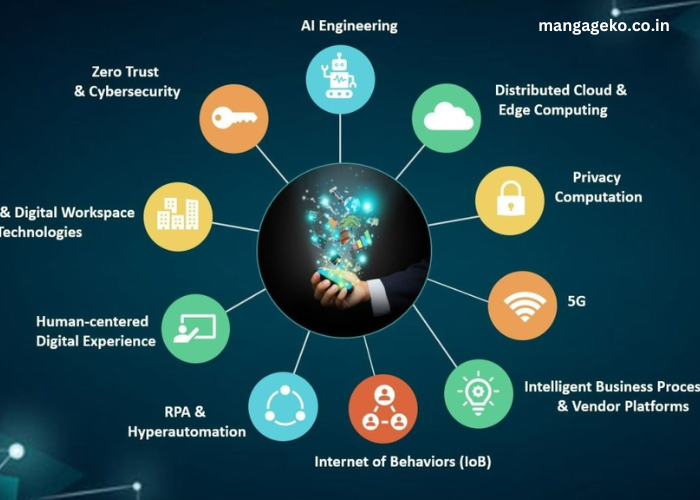The pace of technological advancement is accelerating, and industries worldwide are feeling its impact. As we move into 2025, several key tech trends are poised to change the way businesses operate, interact with customers, and deliver services. These trends are not only revolutionizing individual industries but also creating new opportunities for growth, efficiency, and innovation.
From the rise of artificial intelligence (AI) to the expansion of 5G networks and the integration of blockchain, businesses must stay on top of these developments to remain competitive. In this article, we’ll explore the top tech trends in 2025 and how they’re set to change industries across the globe.
The tech landscape in 2025 will be vastly different from what we see today. The rapid development of next-generation technologies such as AI, machine learning, augmented reality (AR), virtual reality (VR), blockchain, and 5G is changing the way industries operate. These technologies are enabling new business models, enhancing customer experiences, and improving operational efficiency.
The following tech trends are among the most significant drivers of change in 2025 and beyond:
Key Points:
- AI and machine learning are transforming business operations.
- 5G is driving faster, more reliable communication.
- Blockchain is increasing security and transparency across industries.
How Is Artificial Intelligence (AI) Revolutionizing Industries?
AI is one of the most powerful tools businesses have at their disposal in 2025. It’s no longer just about automating simple tasks; AI is driving innovation, improving decision-making, and enabling businesses to provide more personalized experiences for their customers.
AI in Automation and Efficiency
AI-powered automation is revolutionizing various industries by performing repetitive tasks more efficiently than humans. From automating customer service with chatbots to streamlining supply chain management, AI is helping businesses save time and reduce operational costs.
For instance, in the manufacturing sector, AI-driven robots are being used to assemble products with precision and speed, significantly improving productivity. In healthcare, AI is being used for early disease detection and personalized treatment plans, leading to better patient outcomes.
Real-World Example
In the retail sector, AI is being used for inventory management. By analyzing customer purchase behavior, AI systems predict demand and optimize stock levels, ensuring that products are available when customers need them.
What Role Does 5G Play in Industry Transformation?
5G technology is set to transform industries by offering faster, more reliable internet speeds. With its low latency and higher bandwidth, 5G is enabling innovations that were previously impossible with older network technologies.
Enhancing Connectivity and Communication
In 2025, 5G will provide the backbone for emerging technologies like IoT, autonomous vehicles, and remote medical services. It will enable real-time communication between devices and systems, improving decision-making and streamlining operations.
In healthcare, for example, 5G will allow doctors to perform surgeries remotely with the aid of robotic systems, providing healthcare access to remote areas. In the logistics industry, 5G will allow for the real-time tracking of goods, improving supply chain visibility and efficiency.
Real-World Example
Smart cities are another area where 5G will make a significant impact. With 5G connectivity, cities can implement real-time traffic management, smart lighting, and better waste management systems, making urban environments more efficient and livable.
Comparison Table: 5G vs. 4G
| Feature | 4G | 5G |
|---|---|---|
| Speed | Up to 1 Gbps | Up to 20 Gbps |
| Latency | 30-50 milliseconds | 1 millisecond or lower |
| Connection Density | Can support 100,000 devices/km² | Can support 1 million devices/km² |
| Applications | Streaming, video calls | Autonomous vehicles, IoT, AR/VR |
How Is Blockchain Reshaping Industries?
Blockchain is one of the most innovative technologies of the past decade. It’s not just for cryptocurrencies; blockchain has the potential to revolutionize industries by enhancing transparency, security, and efficiency.
Blockchain in Supply Chain and Finance
Blockchain’s ability to create secure, decentralized records makes it ideal for tracking products and transactions. In supply chains, it allows companies to trace goods from origin to destination, ensuring the authenticity and quality of products.
In finance, blockchain technology is improving the security of financial transactions by removing the need for intermediaries. This reduces the risk of fraud and accelerates the transfer of money across borders.
Real-World Example
IBM’s Food Trust blockchain is an example of how blockchain is transforming supply chains. It tracks food products from farm to table, providing transparency and reducing the risk of contamination.
How Is Augmented and Virtual Reality Changing Industries?
AR and VR are not just for gaming and entertainment. These immersive technologies are being integrated into industries such as retail, real estate, education, and healthcare, providing innovative ways to engage customers and improve business operations.
AR and VR in Retail and Real Estate
In retail, AR is used to create virtual try-ons, allowing customers to try on clothes or visualize products in their home environment before making a purchase. In real estate, VR is helping potential buyers take virtual tours of properties, saving time and improving decision-making.
In education, VR is being used to create immersive learning experiences, while AR is being used to overlay digital information onto the real world to enhance learning.
Real-World Example
In the automotive industry, companies like Audi are using VR to allow customers to explore car models in detail without physically visiting a dealership. This offers an immersive experience and makes it easier for customers to make informed decisions.
Reminder: AR and VR improve customer engagement and offer immersive experiences across multiple industries.
Conclusion
In 2025, technology is continuing to push the boundaries of what is possible across industries. From AI-driven automation and the introduction of 5G networks to the implementation of blockchain for secure transactions and the integration of AR/VR into consumer experiences, these innovations are reshaping how businesses operate and how consumers interact with them.
As these technologies evolve, businesses that adopt and adapt to these trends will be in a stronger position to succeed in an increasingly digital world. The key to success in 2025 and beyond will be staying agile, embracing new technologies, and leveraging them to drive innovation and create value.
FAQ’s
- How is AI transforming industries in 2025?
- AI is automating tasks, improving decision-making, and enhancing customer experiences in industries like healthcare, retail, and manufacturing.
- What impact will 5G have on industries?
- 5G will enable faster, more reliable communication, powering innovations like autonomous vehicles, smart cities, and remote healthcare.
- How does blockchain enhance security in business operations?
- Blockchain provides secure, transparent, and immutable records, which reduces fraud and enhances trust in transactions, especially in finance and supply chains.
- How will AR and VR impact customer experiences?
- AR and VR offer immersive, interactive experiences that allow customers to virtually try products, explore properties, or learn in innovative ways.
- What is the role of automation in business efficiency?
- Automation powered by AI and robotics increases productivity, reduces human error, and frees up employees for more complex tasks, driving business growth.




